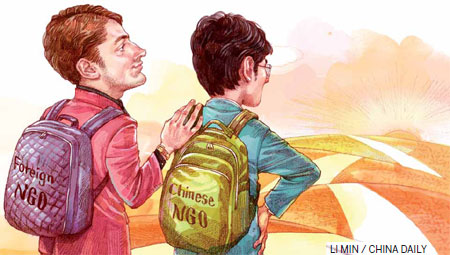Changing role


Evolving economic paradigm makes NGOs crucial catalyst for social goals
Giving back to the community and charity are the common tag lines used globally to identify non-governmental organizations (NGOs). But that may soon change as organizations in China are fast reshaping the role and definition of NGOs in modern times.
|
||||
Here is how that could soon be a reality. In the foreseeable future, farmers from Africa may soon find that high-yield rice seedlings, being developed jointly by the Chinese government and the Bill & Melinda Gates Foundation, may help the continent stave off most of its hunger problems.
Rather than funding projects to tackle China's hunger challenge, much like what the Rockefeller Foundation did about 30 years ago, the Seattle-based Bill & Melinda Gates Foundation has opted to work with the Ministry of Science and Technology to help Chinese scientists find solutions to food problems in other developing nations.
"China has progressed rapidly to something that is in-between a developed economy and developing economy. It is now willing to do things for others and becoming better at it. We consider China an integral partner in our endeavors to help the not-so well-off nations," says Ray Yip, chief representative of the Bill & Melinda Gates Foundation in China.
By latest count, there are about 2,000 international non-governmental organizations that are operating in China. Like the Bill & Melinda Gates Foundation, many other NGOs are also watching with close interest the pendulum swinging slowly from receiver to donor in China.
Experts, however, say that the role of global NGOs in China is poised for even more changes as the nation transitions from the "upper middle income" economy to a "high income" economy over the next 15 to 20 years.
Today's Top News
- Xi calls for promoting volunteer spirit to serve national rejuvenation
- Xi chairs CPC meeting to review report on central discipline inspection
- Reunification will only make Taiwan better
- Outline of Xi's thought on strengthening military published
- Targeted action plan to unleash consumption momentum
- Separatist plans of Lai slammed


































